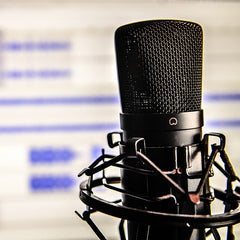Concerning Vocal Recording
Since the vocal is usually the most important component of the recording of any song, it has to be exactly right. But getting it exactly right is the most difficult part of the entire recording process. Singers come in three basic types: First there is the top class performer who always gets it right, and the only other possibility is that he or she might go for another take and sing even better. Among people who call themselves singers, this type is one in a thousand! Usually you will be working with the second type who is someone who obviously can sing, but under the studio spotlight many defects become significant. The third category of singer is someone who has been chosen for his or her looks or personality and sings like a donkey. Well... You're in big trouble here, but you've got to pull through!
There are certain actions you can take to make sure the vocal is recorded as well as possible. Let's start with things that help even the best singers, and then work up to the more drastic solutions.
It isn't widely appreciated, but even the top singers need help to allow them to sing the way they do. We take it for granted that a champion tennis player needs a coach. So a top singer needs a coach too. There are two types of people who work with singers to improve their performance. One is a singing teacher who will help with the production of the sound, and the other is a voice coach who will help with the performance of a song. For our requirements, a basic singing teacher is probably the best option. (Bear in mind that some people who advertise themselves as 'voice coaches' work with speech rather than singing, so be careful not to get confused). Most singing teachers specialise in musicals or classical singing rather than Pop, Rock or Death Metal, but the principals of voice training are very similar. Anyone with a weak, wobbly voice, lacking in range will benefit enormously from two or three months of weekly lessons. Even if the teacher doesn't understand the style of music in which you are working and thinks your singer wants to be the Phantom of the Opera, it will still work. It's like going to the gym - you do exercises in there that bear no relation to any activity you would perform in real life, but if you go regularly you will end up feeling fit and looking good. Go to singing lessons and your voice will feel fit and it will sound good, in any style of music.
Once you have taken steps to make sure that the singer's voice is at the peak of condition, then it is up to you to decide how to handle the session. It isn't as commonly known as it should be that even a good singer needs a lengthy warm up session before he or she can sing at peak performance. It is normal for this warm up to takes as long as an hour before the voice achieves real depth and fullness of sound - start recording too soon and you will have to use effects units to strengthen the voice artificially. Of course it is important not to over stretch the voice during the warm up and wear it out so watch out for any sign that the singer is straining. Experienced vocalists will have their own warm up routine, which they will probably want to carry out in private, so you should arrange a space where they can be on their own. An inexperienced singer, or one who has not yet recognized the need for a warm up, will need a certain amount of coaxing. Get them to sing other songs in their repertoire to loosen up. Once the voice is fully fit, or perhaps a little earlier, you can start rehearsing the song. Once again, many singers don't understand the need for rehearsal and would probably just dive straight into recording. It's not your song, (probably) so don't go telling them how they should sing it, but listen to what they are doing and seek out ways in which whatever there is inside the singer can be brought out to the maximum. Probably the most important factor is the phrasing of each line, how it starts and ends, how much weight is given to each word and to each note. Working on phrasing will need skills that can only be developed with experience - but eventually you will be able to take a raw performance and double its effectiveness. Of course you should also consider details like intonation, and whether the words are intelligible. If a particular note seems to be a problem, see if you can get the singer to recognise and correct the problem before recording commences. If you can't make out some of the words without close scrutiny of the lyric sheet (which you should have a copy of), then consider whether the song could be improved with a little extra clarity in the vocal delivery. Sometimes the opposite is preferable!
With the help of the engineer you will select a microphone that works well with the singer's voice, and sort out other technical matters. Many producers these days record a number of takes of the vocal, maybe as many as six or eight, and then sort through them later to get the best version of each line. With a little bit of skill you and the engineer will be able to compile the best of all of these versions, perhaps to the extent of swapping between takes on every line, or even the odd word where necessary. After this, there may still be the odd line that doesn't sound quite right, so you'll have to get the vocalist back in again to correct it. You may worry that since the time required to compile several takes into one can be quite lengthy, the vocalist may come back with a different tone of voice. Indeed, this may be a problem, but it is better than leaving a line in an unusable state. If you listen very carefully to records made by people chosen by the record company for their looks or personality, you will almost certainly be able to hear these inconsistencies. If it were possible to record a perfect vocal in one take, everyone would do it that way. Unfortunately the singers who are capable of doing this are, as said previously, very few and far between.
If the worst comes to the worst and you just can't get a satisfactory recording, then you will have to use a little studio trickery - or a lot of it if necessary. This can range from double tracking, pitch shifting out of tune notes using a Harmonizer, or sampling a line and tweaking the pitch bend control as you record it back to tape, to a total reconstruction of the vocal using an audio sequencer with time and pitch correction software. If you think this is extreme, then be assured you that it is in fact normal to do anything that is necessary to achieve a perfect vocal, because that is what is going to sell the song. If you don't have the technical skills yourself to take on these tasks, sit back and let the engineer or programmer do it for you. All you have to do is decide when it's right!





